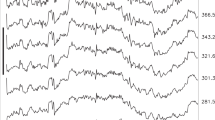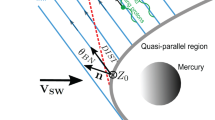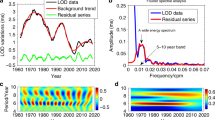Abstract
RADIO observations on the solar eclipse of June 19, 1936, were made by the Oxford University Arctic Expedition 1935–36 in North-East Land at 80° 23 N., 19° 31 E. in accordance with the programme arranged by a sub-commission of the U.R.S.I. One complete record showing the relationship between the equivalent height of reflection and the frequency of the exploring wave was obtained in steps of 0.2 me./sec. The records, each of which took ten minutes to secure, were centred on each hour and half-hour from 03.30 to 07.30 G.M.T. on June 18, 19 and 20, 1936 (Fig. 1). Short-period variations would not therefore be observed.
This is a preview of subscription content, access via your institution
Access options
Subscribe to this journal
Receive 51 print issues and online access
$199.00 per year
only $3.90 per issue
Buy this article
- Purchase on Springer Link
- Instant access to full article PDF
Prices may be subject to local taxes which are calculated during checkout
Similar content being viewed by others
Author information
Authors and Affiliations
Rights and permissions
About this article
Cite this article
WHATMAN, A., HAMILTON, R. Radio and Magnetic Observations at North-East Land during the Total Solar Eclipse of June 19,1936. Nature 139, 69–70 (1937). https://doi.org/10.1038/139069a0
Issue Date:
DOI: https://doi.org/10.1038/139069a0
Comments
By submitting a comment you agree to abide by our Terms and Community Guidelines. If you find something abusive or that does not comply with our terms or guidelines please flag it as inappropriate.



